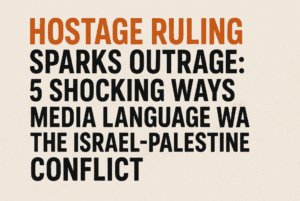Hostage Ruling Sparks Outrage: 5 Shocking Ways Media Language Warps the Israel-Palestine Conflict
The UK’s press regulator, IPSO, has stirred controversy by ruling that Palestinian prisoners held by Israel—including Hamas militants and detainees without trial—can be termed “hostages” in media reports. The decision followed a complaint against The National for a headline describing 369 prisoners released in a 2023 ceasefire as “hostages,” which critics argued falsely equated them with Israeli civilians abducted by Hamas. IPSO dismissed the complaint, calling the term “subjective” and not “significantly inaccurate,” despite the BBC previously correcting similar language.
Advocacy groups condemned the ruling, stressing it risks legitimizing militant tactics and eroding distinctions between unlawful abductions and contested detentions. The debate underscores the fraught role of language in framing conflict, with critics warning such terminology could distort public understanding of justice, terrorism, and victimhood. IPSO’s stance also follows recent accusations of stifling free speech, deepening concerns over media ethics in polarized contexts. The ruling highlights the broader challenge of balancing editorial discretion with factual precision in coverage of deeply divisive conflicts.

Hostage Ruling Sparks Outrage: 5 Shocking Ways Media Language Warps the Israel-Palestine Conflict
The UK’s Independent Press Standards Organisation (Ipso) has ignited controversy by ruling that Palestinian prisoners held in Israeli jails can legally be referred to as “hostages” in media reports. The decision, which followed a complaint about a headline in The National newspaper, has drawn sharp criticism from advocates for accuracy in Middle East coverage and raised questions about the role of language in shaping public perception of the Israel-Hamas conflict.
The Controversial Ruling
In November 2023, The National published an article titled “Hundreds of Palestinian hostages released by Israel”, referring to 369 prisoners exchanged for Israeli captives during a temporary ceasefire with Hamas. Adam Levick, co-editor of the Committee for Accuracy in Middle East Reporting (CAMERA), argued the term “hostages” falsely equated convicted Hamas militants and detainees—many held without trial under Israeli security laws—with Israeli civilians abducted during Hamas’ October 7 attacks.
Ipso dismissed the complaint, stating the term was “subjective” and not “significantly inaccurate,” noting many prisoners were administrative detainees (held without charge) and others were serving life sentences for violent offenses. The regulator emphasized the “contentious” nature of the conflict but declined to rule on the moral equivalence implied by the language.
Critics: A Dangerous Precedent
Levick condemned the decision as “shocking,” pointing to the BBC’s recent correction after similarly mislabeling Palestinian prisoners as “hostages.” “This undermines the distinction between innocent civilians taken by terror groups and individuals incarcerated for security-related offenses,” he told The Telegraph. Critics argue the ruling risks legitimizing Hamas’ strategy of leveraging prisoner exchanges, which often include militants implicated in attacks on Israeli citizens.
The debate touches on broader tensions over media framing. While human rights groups criticize Israel’s use of administrative detention—a practice allowing indefinite imprisonment without trial—the term “hostage” typically denotes individuals held unlawfully to extract concessions. Palestinian prisoners, even those detained without charge, are subject to Israel’s judicial system, however contested.
Ipso Under Fire
This ruling follows recent accusations that Ipso is stifling free speech after it reprimanded The Telegraph for republishing parliamentary remarks. Free speech advocates warn that inconsistent rulings could erode trust in press regulation. Meanwhile, pro-Palestinian groups applaud the decision as a challenge to perceived Western media bias favoring Israel.
Why Terminology Matters
Language remains a battleground in the Israeli-Palestinian conflict. Referring to prisoners as “hostages” may amplify narratives of Palestinian victimhood, while critics stress it risks sanitizing militant violence. For families of Israeli hostages, the comparison is particularly fraught; over 100 captives remain in Gaza, with many feared dead.
The Ipso ruling highlights the fine line regulators walk in balancing editorial freedom with factual precision. As media outlets grapple with polarized audiences, the decision sets a precedent that could influence coverage of future conflicts—and deepen divides over how justice and terrorism are defined.
The Path Forward
The controversy underscores the need for clearer guidelines on conflict-related terminology. While press regulators aim to avoid censorship, cases like this reveal the societal impact of semantic choices. For now, the ruling leaves room for the term “hostages” to persist in certain contexts, ensuring the debate over language—and its power to shape reality—will continue long after headlines fade.
You must be logged in to post a comment.